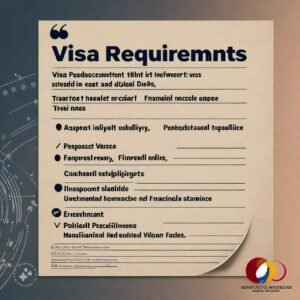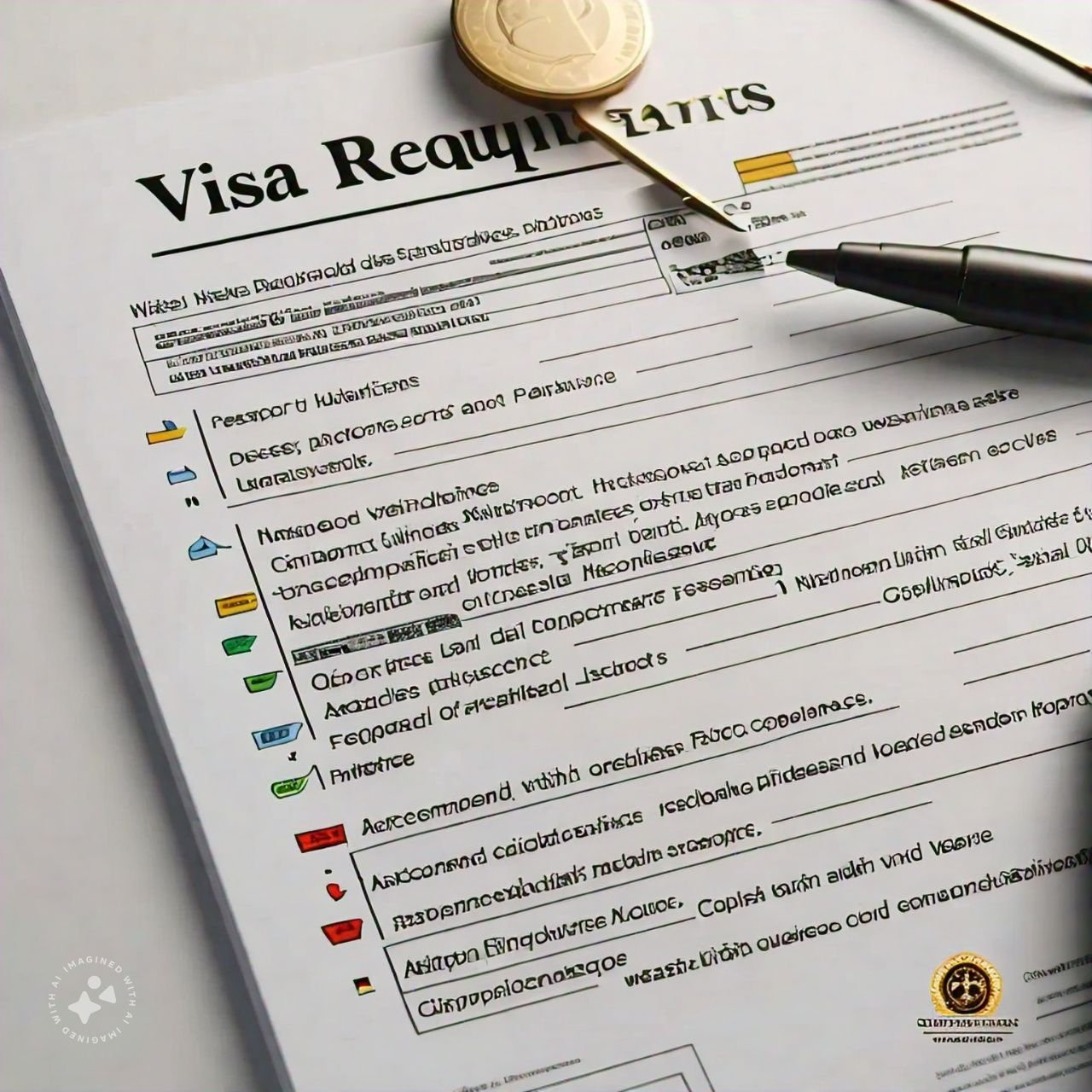Introduction
Understanding passport requirements for visa applications is crucial. Different countries have specific guidelines to ensure your passport meets their standards. This blog outlines essential passport requirements for visas, including validity, condition, and blank pages. Knowing these requirements will help you avoid delays and ensure a smooth application process.
Obtaining a visa involves several important steps, and meeting passport requirements is one of them. Your passport serves as the primary identification document during international travel. Therefore, understanding the specific passport requirements for a visa is crucial. Each country enforces its own set of rules to ensure travelers meet security and identification standards.
The condition and validity of your passport play a significant role in visa approval. Many countries require passports to be valid for a specific period, often six months beyond your intended stay. Additionally, your passport must have enough blank pages for visa stamps and entry or exit markings. Without sufficient pages, your visa application may be delayed or rejected.
Biometric data in modern passports also influences visa applications. Fingerprints and facial recognition are increasingly required for identity verification. If your passport lacks these features, you may need to upgrade before applying. Damaged passports are another critical consideration. Even minor damage can lead to visa rejection, emphasizing the need for a well-maintained document.
In summary, understanding passport requirements is essential for a smooth visa application process. Ensuring your passport meets all necessary criteria can prevent unnecessary delays and ensure successful travel plans. Always check the specific requirements for your destination before starting your visa application.
read more : STEM Scholarships
General Passport Requirements
When applying for a visa, your passport must meet specific general requirements. These requirements ensure that your passport is accepted by the issuing authority. First, your passport must be original and undamaged. Countries often reject passports with tears, stains, or other visible damage. Maintaining your passport in good condition is essential to avoid issues during your visa application.
Your passport must accurately reflect your current personal details. Ensure that your name, date of birth, and other information match your visa application. Discrepancies between your passport and visa application can lead to delays or rejection. Double-check your passport information before submitting your visa application to avoid potential problems.
Another crucial requirement is the validity of your passport. Many countries require your passport to be valid for at least six months beyond your intended stay. This validity period helps prevent complications if your travel plans change unexpectedly. Always check the specific validity requirements of the country you plan to visit.
In addition, your passport must have enough blank pages for visa stamps and entry or exit markings. Most countries require at least two to four blank pages. Ensuring your passport meets these general requirements will streamline your visa application process and prevent unnecessary delays.

Passport Validity for Visas
Passport validity is a crucial factor when applying for a visa. Many countries require your passport to be valid for at least six months beyond your planned departure date. This requirement ensures that your passport remains valid throughout your stay. It also provides a buffer period in case of unexpected travel delays or extensions.
If your passport has less than six months of validity, you may face issues. Some countries may deny entry or refuse to issue a visa. Therefore, it is advisable to renew your passport before applying for a visa if it is nearing expiration. This precaution helps you avoid potential travel disruptions.
In addition to the six-month rule, some countries have different validity requirements. For example, certain countries may accept a passport with three months of validity. However, it is always safer to have a passport with an extended validity period. Checking the specific requirements for your destination country is essential before starting your visa application.
In summary, ensuring your passport meets the validity requirements is vital for a smooth visa process. Renewing your passport when necessary will help you avoid delays or rejections during your application. Always verify the validity requirements for the country you plan to visit.
Passport Pages and Visa Stamps
When applying for a visa, the number of blank pages in your passport is critical. Many countries require a specific number of blank pages to accommodate visa stamps and entry or exit markings. Typically, most countries demand at least two to four blank pages. These pages are essential for visa officials to stamp your passport without any issues.
If your passport lacks enough blank pages, your visa application may be delayed or rejected. Immigration authorities may refuse to issue a visa if there is insufficient space for their stamps. To avoid complications, check your passport before applying for a visa. Ensure it contains the required number of blank pages for your destination country.
In some cases, you may need to renew your passport if it lacks enough pages. This step is crucial, especially for frequent travelers who quickly fill their passport pages. It’s always better to have more blank pages than required to prevent any problems during your travels. Renewing your passport with enough blank pages ensures a smoother visa application process.
In conclusion, maintaining enough blank pages in your passport is vital for a successful visa application. Always verify the specific requirements for your destination to ensure seamless entry and avoid any travel disruptions.
read more: Types of Business Scholarships
Damaged Passports and Visa Applications
A damaged passport can significantly affect your visa application. Most countries require passports to be in good condition. A passport with visible damage, such as tears, water stains, or worn-out pages, may be rejected. Immigration authorities view damaged passports as a potential security risk, leading to complications in the visa process.
Even minor damage can cause problems during your visa application. For instance, a slightly torn cover or a loose page might seem insignificant, but visa officials may consider it a serious issue. If your passport shows any signs of damage, it’s best to replace it before applying for a visa. This proactive step can prevent unnecessary delays or outright rejection of your application.
In addition to physical damage, other issues, such as smudged or faded information, can also cause problems. Passports must have clearly legible details to be accepted for visa purposes. If your passport’s information is hard to read, you should consider obtaining a new one.
In summary, ensuring your passport is in perfect condition is essential for a smooth visa application process. Always inspect your passport for any damage and address any issues before applying for a visa to avoid complications.
Passport Renewal and Visa Validity
Passport renewal is crucial when your passport approaches its expiration date, especially for visa applications. Many countries require that your passport be valid for a certain period beyond your travel dates. Typically, this period is at least six months. If your passport is nearing its expiry, renewing it ensures that you meet these requirements.
Renewing your passport before applying for a visa helps avoid complications. An expiring passport can affect the validity of your visa. Some countries might link the visa’s validity to your passport’s expiration date. Therefore, if your passport expires soon, the visa may also be limited or invalid.
It is advisable to renew your passport well in advance of your travel plans. This approach gives you ample time to complete the renewal process and apply for your visa. Waiting until the last minute can lead to delays and disrupt your travel plans.
In summary, timely passport renewal is essential to maintain visa validity. Ensure your passport has sufficient validity and renewal time to meet visa requirements. Checking and renewing your passport before applying for a visa will help you avoid unnecessary issues and ensure a smooth travel experience.

Conclusion
Meeting passport requirements is crucial for a successful visa application. Ensuring your passport is valid and undamaged prevents delays and complications. Check the specific requirements for your destination country to avoid issues. Each country has different rules regarding passport validity, blank pages, and biometric data.
A valid passport should be free of damage and have enough blank pages. Most countries require your passport to be valid for at least six months beyond your stay. Ensure you renew your passport in advance if it is nearing expiration. This precaution helps avoid potential visa rejections or travel disruptions.
Maintaining your passport in good condition is also essential. Minor damages or discrepancies can lead to delays or rejections. Always inspect your passport for any signs of damage before applying for a visa. Renewing your passport when necessary ensures you meet all visa requirements and avoid unnecessary delays.
In summary, understanding and meeting passport requirements is vital for smooth visa processing. Proper passport management and timely renewal will help you avoid issues and ensure successful travel. Always verify the specific requirements for your destination and plan accordingly to ensure a hassle-free visa application process.
Frequently Asked Questions (FAQs)
1. What should I do if my passport is damaged?
If your passport is damaged, replace it before applying for a visa. Damaged passports can lead to visa rejection or delays. Contact your passport issuing authority to get a new passport as soon as possible.
2. How long should my passport be valid for a visa application?
Many countries require your passport to be valid for at least six months beyond your planned departure date. Check the specific requirements of your destination country to ensure compliance.
3. How many blank pages do I need in my passport for a visa?
Most countries require at least two to four blank pages in your passport. These pages are needed for visa stamps and entry or exit markings. Ensure your passport has enough blank pages before applying.
4. Can I use a passport with minor damage for a visa application?
Minor damage, such as small tears or stains, can lead to visa application issues. It is best to replace a damaged passport to avoid complications and ensure smooth processing.
5. What if my passport is close to expiring?
Renew your passport before applying for a visa if it is nearing expiration. Some countries link the visa’s validity to your passport’s expiration date. Renewing your passport in advance helps prevent potential visa issues.
6. How can I check if my passport meets the visa requirements?
Check the visa requirements of your destination country for specific passport guidelines. Ensure your passport is valid, undamaged, and contains enough blank pages. Consult the embassy or consulate for detailed information if needed.
